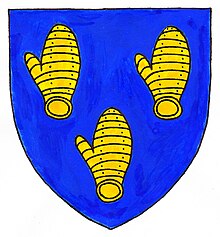John Fane, 7th Earl of Westmorland
John Fane, 7th Earl of Westmorland (24 March 1685 – 26 August 1762), styled The Honourable John Fane from 1691 to 1733 and Lord Catherlough from 1733 to 1736, was an English nobleman and soldier.
John Fane was the son of Vere Fane, 4th Earl of Westmorland and his wife Rachel Bence. He was admitted at Lincoln's Inn in 1703, and entered as a fellow commoner at Emmanuel College, Cambridge in 1703/4. It is likely that his older brother Thomas influenced his decision to become Member of Parliament for Hythe in 1708, a position which he held until 1711. That same year, he joined the army and fought at Oudenarde and Lille. After the war, he returned to England with a letter for the Lord High Treasurer, Lord Godolphin, from the Duke of Marlborough, who wrote that "Fane behaved himself very well, so that I am desirous you would do him the honour of presenting him to the Queen. I like him much better than his brother [Westmorland]." A year later, however, he left for the continent again, this time as a Captain of horse in William Cardogan's regiment, and saw action at Malplaquet.
In 1709 and 1710, he was re-elected as Member of Parliament for Hythe, but he was forced to relinquish his seat in 1711 due to a petition by Tory candidates. He later became Member of Parliament for Kent from 1715 to 1722, and for Buckingham from 1727 to 1734. While originally a Whig, Fane changed sides and became a Tory during the reign of George II. He may also have been involved in Jacobite intrigues.
...
Wikipedia

